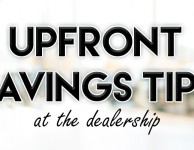5 Tips for Finding Great Prices Online at Used Car Dealerships
Shopping for cars online can eliminate a lot of the hassle that comes with the process of purchasing a car. Many used car dealerships now offer plenty of information online to help you navigate the process quickly and effectively. However, make sure you know how to identify good deals online before you commit to buying a vehicle!
1. Look for positive signs
To begin with, it’s important to have a set of standards for used car dealerships. When you visit a dealer’s website, browse around for long enough to make sure that the dealer is going to meet your standards, which might include:
- No haggle pricing. You don’t want to get nailed with hidden fees!
- Readily available vehicle history reports, preferably AutoCheck Vehicle History reports. These reports ensure that the car doesn’t have serious problems that could come back to haunt you and include the car’s history from prior owners, leases, commercial services or auctions.
- Positive customer reviews. Are customers pleased with the cars that they bought at the dealership? How about their level of customer service pre- and post-sale? Does the dealership have a good reputation? If so, that’s definitely a good sign for you!
2. Watch out for red flags
On the other hand, it’s important to know what red flags to watch out for! Once you’ve identified several potential dealers that exhibit positive signs, eliminate any that trigger red flags, such as:
- Consistently negative customer reviews. Reviews are most likely one of your surest sources of reliable information about the reputation of the dealer. If you are unsure about the validity of the reviews, check websites such as Consumer Affairs, TrustPilot or the BBB, which verify that the reviewers were actual customers.
- Sensationalized prices. Taking into account the fact that every dealer is going to make sure that he is making a profit even on the cheapest cars, make sure that the low prices the dealer is advertising are actually legitimate.
- Fishy title history. If a dealer is selling vehicles that don’t have a verifiable vehicle history report, it’s probably smart to go with a dealer that provides legitimate documentation.
3. Compare prices
Obviously, part of getting the best prices is to shop around and compare different deals. Make sure that you are making a fair comparison – no-haggle used car dealerships may list a slightly higher price, but other dealers are likely to tack on extra fees and costs that actually make their prices far higher.
4. Research specific cars
Naturally, before you commit to a specific car, you want to do some research about the make and model that you are considering. Companies like Consumer Reports and Edmunds offer in-depth analysis on the performance of every vehicle on the market. Even if you are only interested in used cars, it’s good to get an idea of how the car performs, past recalls and any potential problems it may present.
5. Prepare a list of questions
Be ready to ask lots of questions when you talk to a dealer! Even if you’re shopping online, it’s smart to have a dialogue in order to make sure that all of your questions and concerns are addressed. Don’t forget to include the following questions in your discussion:
- Does the vehicle have an AutoCheck History Report?
- What sort of average fuel economy can I expect from this car?
- Have you had a mechanic inspect the car?
- Does the vehicle have an existing warranty?
- Do you offer a return policy?
- Do you report to credit bureaus?
You’ll likely have many more questions as you move through the (hopefully painless) buying process. Don’t be nervous or ask questions. The staff should be polite, open and professional and be able to comfortably answered any questions or address any concerns you may have.
What’s the first question that comes to you mind when it comes to buying a used car?






